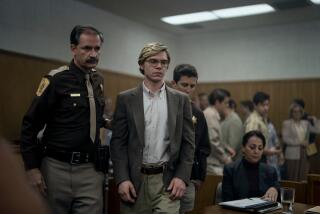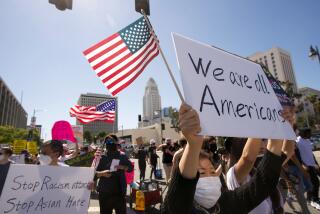Black-on-Black Crime Is Not OK
- Share via
When Travon West was shot and killed this spring, no one marched to protest his death. The NAACP kept silent. I saw no dignitaries or notable celebrities at his funeral and the resounding speeches from the voices of black activists could not be heard.
West, a 22-year-old black man, was killed by another black man.
Our nation recently has been subjected to the controversial police shooting of 19-year-old Tyisha Miller in Riverside; the 1997 police brutality case of 32-year-old Abner Louima, a Haitian immigrant in New York, and the death of Amadou Diallo, a West African immigrant killed by New York police officers earlier this year with 41 shots.
When a black person is killed by a white person it is injustice. But when we kill ourselves, we often ignore it.
Police brutality and racially motivated murders are wrong, unjustifiable and should not be tolerated. Black-on-black crime is wrong, unjustifiable and also should not be tolerated.
The recent statistics released by the FBI reveal why we shouldn’t ignore the black-on-black crime issue: There has been a 7% drop in crime nationwide. But about the 49% of victims whose race was identified were reported to be black; more than 95% of these victims were killed by other blacks.
To act in exasperation when a white person kills a black person and not to react at all when a black kills another black implies that black-on-black crime is acceptable.
During the 100-hour war with Iraq in 1990, more African American men were killed in American streets than in Kuwait. And even today, murder is the No. 1 cause of death among African American males between the ages of 18 and 24.
The Brotherhood Crusade, led by Danny Bakewell, along with other organizations including the Rainbow/Push Coalition, Congress of Racial Equality and the NAACP, are urging people to write U.S. Atty. Gen. Janet Reno and ask that federal criminal charges be filed against the Riverside police officers.
I also believe there should be an investigation into the police shooting death of 54-year-old Margaret LaVerne Mitchell, a homeless woman in Los Angeles whose only weapon was a screwdriver. If we don’t like what we see, then it is our responsibility to change it. But at some point we must accept responsibility for our own actions.
This is a time for introspection and not pointing the finger. Black-on-black crime not only affects our status, it affects innocent victims, children and our community. Investors do not want to invest in areas where crime is a part of everyday life.
We must not allow black-on-black crime to propel us deeper into the mire of adversity. Let’s do something about police brutality, hate crimes and racially motivated murders. But let’s also do something about black-on-black crime.
More to Read
Sign up for Essential California
The most important California stories and recommendations in your inbox every morning.
You may occasionally receive promotional content from the Los Angeles Times.













